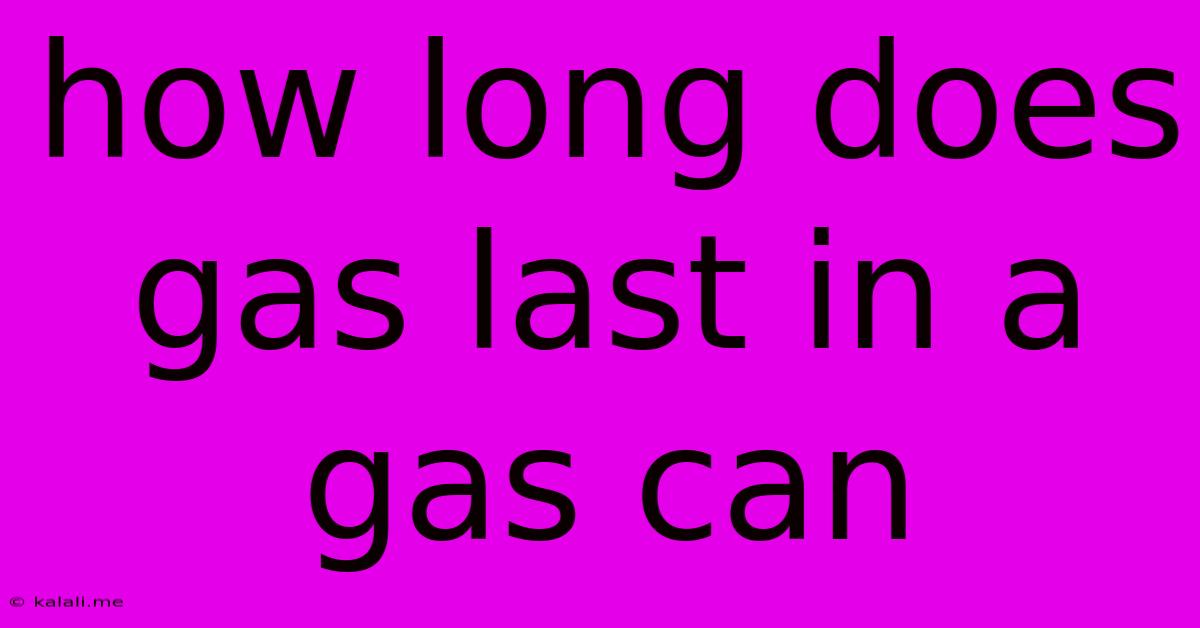How Long Does Gas Last In A Gas Can
Kalali
May 22, 2025 · 3 min read

Table of Contents
How Long Does Gas Last in a Gas Can? A Comprehensive Guide
Knowing how long gasoline remains usable in a gas can is crucial for anyone who stores fuel for various purposes, from lawnmowers to generators. Improper storage can lead to degraded fuel, impacting engine performance and potentially causing damage. This guide explores the factors affecting gasoline shelf life and offers tips for extending its usability.
Factors Affecting Gasoline Shelf Life:
Several factors influence how long gasoline stays good in a gas can:
-
Type of Gasoline: The type of gasoline itself plays a role. Regular unleaded gasoline typically degrades faster than premium grades due to differences in additives.
-
Storage Container: The material and condition of your gas can significantly impact fuel quality. Using a proper, sealed, and clean container made of approved materials is essential. Avoid rusty or damaged cans.
-
Storage Conditions: Exposure to sunlight, heat, and air accelerates the degradation process. Storing the gas can in a cool, dark, and well-ventilated area is crucial. Avoid direct sunlight and extreme temperatures.
-
Fuel Additives: Using fuel stabilizers can significantly extend the shelf life of gasoline. These additives help prevent the breakdown of fuel components.
-
Initial Fuel Quality: Starting with high-quality, fresh gasoline will naturally lead to better long-term storage.
How Long Does Gasoline Typically Last?
Without stabilizers, gasoline begins to degrade relatively quickly. Under ideal storage conditions (cool, dark, sealed container), gasoline might remain usable for:
-
3-6 Months: This is a conservative estimate, even under good conditions. The fuel might still ignite, but its performance might be compromised.
-
12 Months: This is highly unlikely without stabilizers. After this period, the fuel is likely to be severely degraded.
Signs of Degraded Gasoline:
Several signs indicate that your gasoline has degraded:
-
Discoloration: The gasoline may turn darker or develop a cloudy appearance.
-
Sediment: The presence of sediment or particles at the bottom of the can is another warning sign.
-
Poor Engine Performance: If using the stored gasoline in your equipment causes poor performance (hard starting, rough running, sputtering), it's a clear indicator of degradation.
-
Smell: A strong, pungent odor, different from the typical gasoline scent, could be an indication of deterioration.
Tips for Extending Gasoline Shelf Life:
-
Use a Fuel Stabilizer: Add a fuel stabilizer to your gasoline before storing it. These additives are readily available at most auto parts stores.
-
Choose the Right Gas Can: Invest in a high-quality, well-sealed, and appropriately sized gas can made from suitable materials. Ensure it is clean and free from rust or damage.
-
Store in a Cool, Dark, and Dry Place: Protect the gas can from direct sunlight, heat, and moisture.
-
Completely Fill the Can: Minimize the air space inside the can to reduce oxidation.
-
Regularly Check the Fuel: Periodically inspect the gas can for signs of degradation, including discoloration and sediment.
Conclusion:
While the exact lifespan of gasoline in a gas can varies greatly depending on various factors, proper storage practices and the use of fuel stabilizers can significantly extend its usable life. Remember to always prioritize safety when handling gasoline and dispose of degraded fuel properly. By following these guidelines, you can ensure your stored gasoline remains effective and minimizes the risk of engine damage.
Latest Posts
Latest Posts
-
Rotate Tubes In Blender Without Changing Thier Diameter
May 23, 2025
-
How To Find A Stud When Stud Finder Isnt Working
May 23, 2025
-
Is It By Name Or By Name
May 23, 2025
-
Error Cant Have A Partition Outside The Disk
May 23, 2025
-
Dnd Can You Move More Than Once
May 23, 2025
Related Post
Thank you for visiting our website which covers about How Long Does Gas Last In A Gas Can . We hope the information provided has been useful to you. Feel free to contact us if you have any questions or need further assistance. See you next time and don't miss to bookmark.